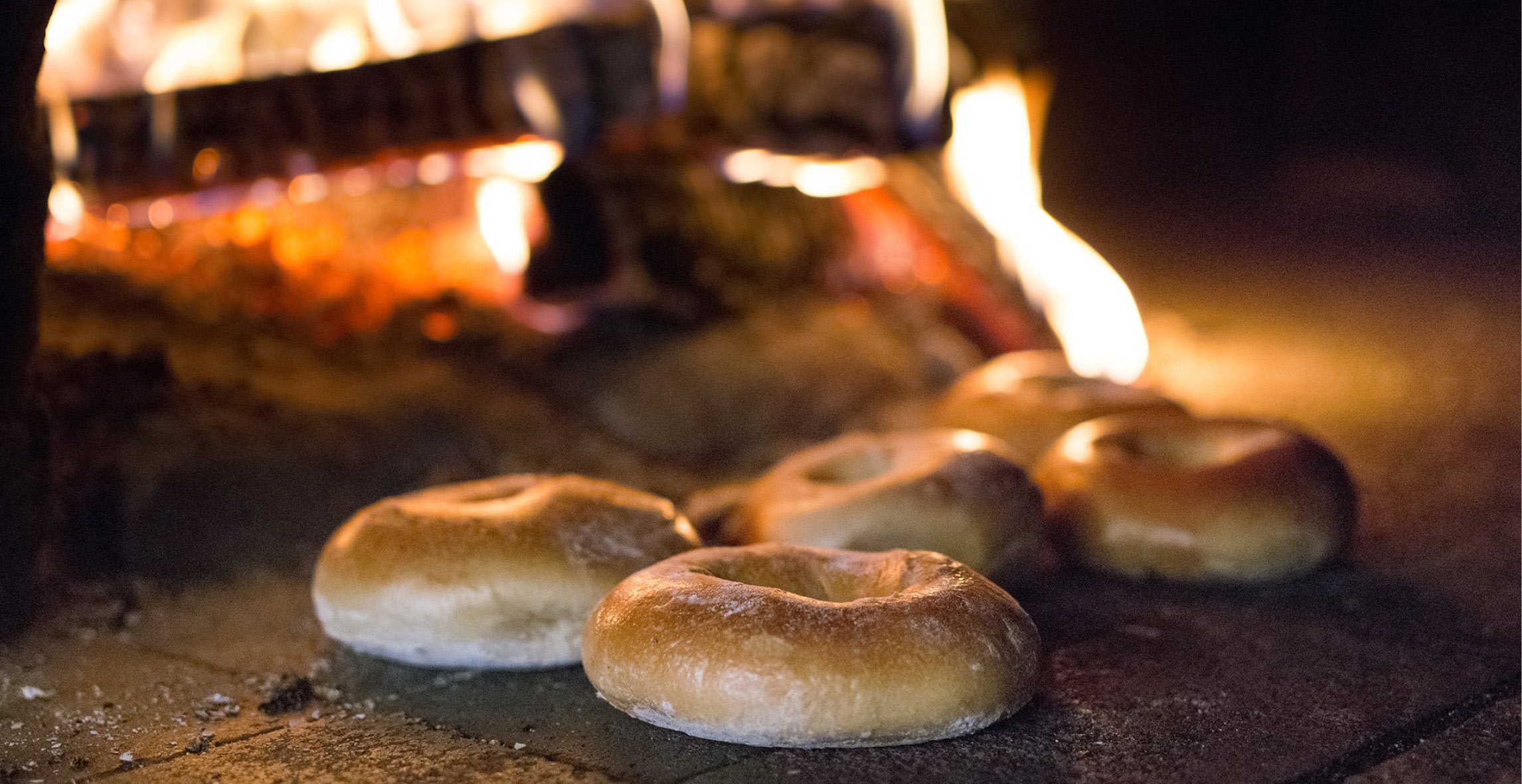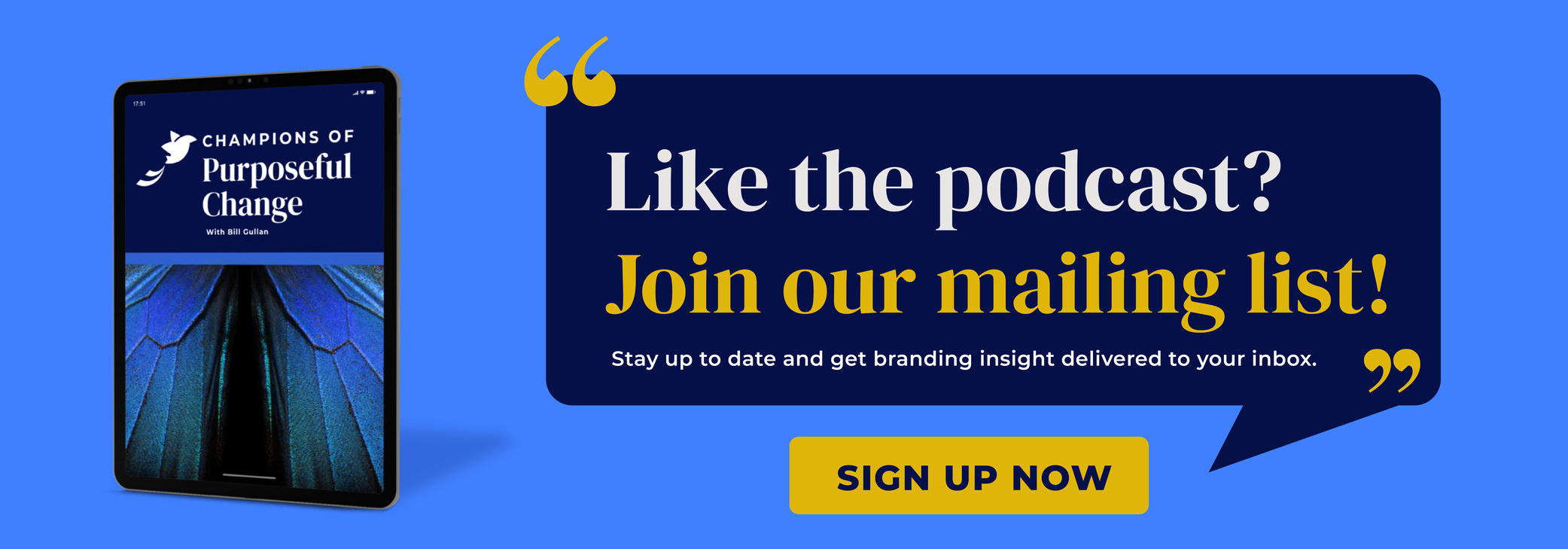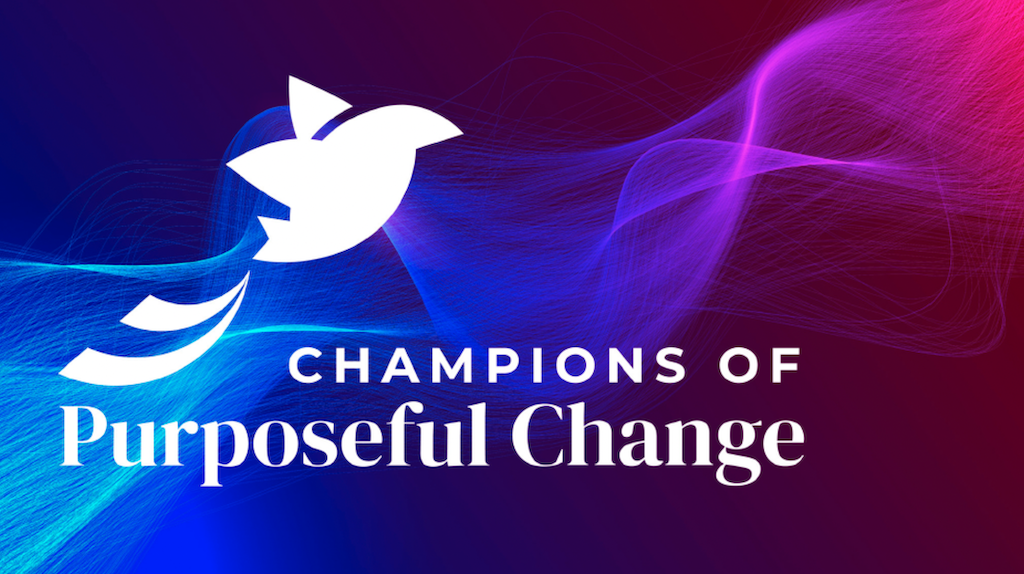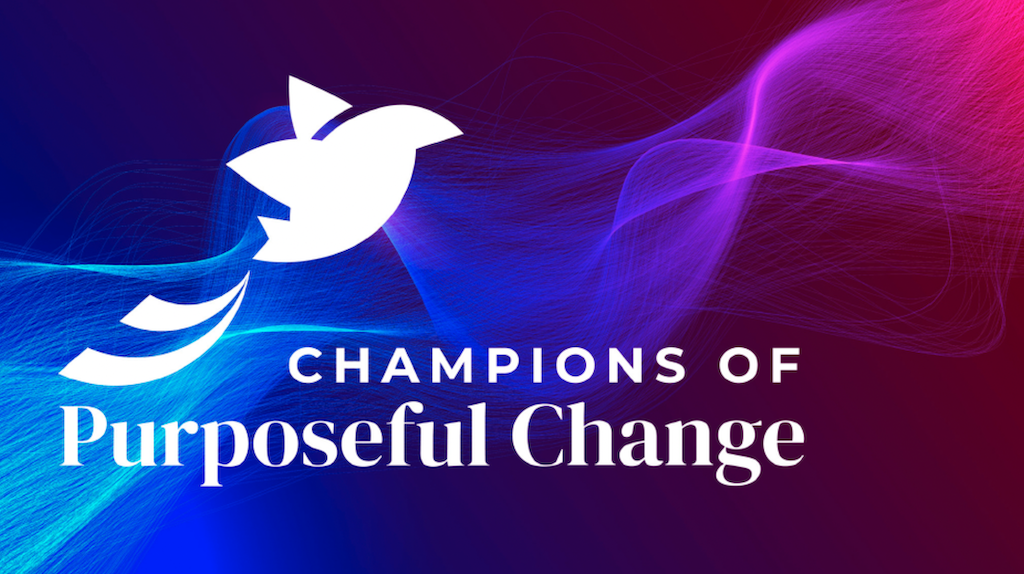Spread Bagelry Manages Growth Through COVID-19 – Jamie Schrotberger, CEO

Today on Real-World Branding, Jamie Schrotberger (CEO of Spread Bagelry) discusses the brand they’re building and how COVID-19 has impacted their business.
With a strong background in finance, Jamie got to know the restaurant business through a financial lens before transitioning into operations and leadership as CFO for Garces Restaurant Group. His current role is as CEO of Spread Bagelry, a 5-unit and growing Montreal-style bagel business. With equal parts hospitality, quality, and operational excellence, Jamie takes us through the Spread story and plan. Additionally, he shares their approach to managing a retail business during this unpredictable time. If you like our podcast, please let us know and subscribe!
Podcast: Download Subscribe: iTunes | RSS
Transcription:
Bill:
Greetings, one and all. This is Real-World Branding. I’m Bill Gullan, President of Finch Brands, a premier boutique brand consultancy. Thank you for joining us and what a time to be alive. I don’t say that with joy, but intrigue and curiosity. This is unprecedented territory for all of us and doing the best we can, and that means bringing new episodes of Real-World Branding to your ears hopefully to help pass the time or keep everyone sane. Hopefully, we’re all sort of chained to our desks and our beds and our homes here. Don’t go out, flatten the curve, but hopefully this podcast can help a little bit.
Bill:
Today, we have Jamie Schrotberger. Now, Jamie’s the CEO of Spread Bagelry. Spread is a five-unit now with two more to come Montreal-style bagel concept. It is delicious and quick-serve and super cool. Jamie’s going to talk about what he’s building at Spread and his own background. We also were fortunate enough to get him… I’m speaking to you right now on the 17th, Tuesday, in the afternoon. We were fortunate enough to get him in this moment and to understand a little bit of the tick-tock of decisions around what to do given the outbreak of this virus and all of the responsibilities that he feels and that we at Finch feel to our colleagues, to our clients. In his case, customers and suppliers and everything else. He’s going to take you through all of that. I think you’ll enjoy hearing it from Jamie Schrotberger.
Bill:
In this momentous week, we’re very grateful for some time and insight from Jamie Schrotberger, who’s the CEO of Spread Bagelry. Thanks for being with us, man.
Jamie:
Hi. You’re very welcome. Glad to be here.
Bill:
Just for the benefit of our listeners, it’s Tuesday, March 17th. We’re speaking in late afternoon and our plan is to get this turned around. I mean, who knows how production goes, but turned around this week. I know when it comes to the coronavirus and everything else, this is a quickly unfolding story and we’ll certainly get to that in a couple of minutes. Why don’t we start where we normally do, Jamie, which is a little bit of your backstory? Sort of catch us up to the role that you’ve taken with Spread. Just kind of how your own journey went career-wise.
Jamie:
Sure, so born and raised in Philadelphia, so I’ve been here my whole life. Spent my college years in… I went to business school in the Midwest and then I started in a job in the financial management industry as an analyst and portfolio manager for really two large organizations. One was New York-based BlackRock and Philadelphia-based Turner Investments. How I got here is really I laid the groundwork in the financial management industry. My focus for 20 years was of an analyst, focusing really on restaurants and retail, private and public equities. I literally met a thousand restaurant firms, both public and private. I was then able to study their income statements, learn best practices from the best management teams. Got to see all of the success stories and a whole lot of failures in the space over 20 years.
Jamie:
I was also a portfolio manager where I was focused on identifying and purchasing innovative or disruptive companies in the small capitalization space. From there, just about two years ago I experienced a move into the hospitality industry as the CFO of Philadelphia-based Garces Restaurants… Garces being an Iron Chef. Garces had just been purchased by a Louisiana- and Philly-based investor group led by Louisiana-based Ballard Brands. I truly loved my experience there, from the people to the different restaurant brands that they had, but my passion is really focused kind of what I’ve been doing at the financial management industry of finding those innovative, disruptive growth stories and allowing myself to see that through and be part of that. I had the opportunity to come over and take over as the CEO of Spread Bagelry just about four months ago and I have been enjoying it ever since.
Bill:
Yeah. Super cool. Undergrad at Denison, economics major –
Jamie:
That’s right
Bill:
We have in common, you’re Denison, I’m Davidson, but folks in the Northeast probably confused them for one another. Then, MBA in Champaign-Urbana at the University of Illinois. You were pretty directed towards finance early it sounds like.
Jamie:
Yes I did. I was, I was. My father was in the financial management industry. Wanted to follow in his footsteps as much as I could. It really led me to that area, which I not only loved, but it was… You had to step away a little bit and think about the bigger picture. A lot of times-
Bill:
Sure/
Jamie:
A lot of people get really focused about the wiggles of the stock market and specific equities, but being portfolio manager, you have to take a little bit longer view and let things play out. One of the reasons for my departure from that industry was based on how short term decision-making had to be done on a weekly and monthly basis. The true great companies had the balance sheets to be able to make long-term decision-making and not worrying about how things were going that week. Because as you know as the leader of an organization, things that you put in place today really don’t have impact for three to six months from now. You have to really be thinking strategically about what’s happening with a whole organization or enterprise.
Bill:
Right, totally. You’ve pivoted within the last several years into a leadership role but an operating role. Certainly, it’s spread.
Jamie:
Correct.
Bill:
What have you found that’s similar or different about your day-to-day these days compared to… Obviously, you were close to the space from a financial analysis perspective, but how’s life different for you these days in an operating capacity as opposed to where you were?
Jamie:
Sure. Well, this probably comes down to lessons learned, and from an investor, you’re sitting on kind of your throne looking down at these companies and analyzing companies. You have your own viewpoint of how things should be done, but the amount of minutiae that has to go through to make every decision happen is something that I had to learn how… Of course, you need to get your cost of goods sold down. You have to control your labor. It’s all part of driving cashflow and EBIDTA to the bottom line for investors or for your owners.
Jamie:
That being said, as an investor you can say that, but actually coming in and doing it is a whole different thing. There was a small learning curve to that, but given the amount of resources that I have had in the… Having my CSA and my MBA and really being able to analyze things really helped me a tremendous amount, and having a great network of restaurant executives that I had met over the 20 years to ask questions to and to learn relatively quickly.
Jamie:
It’s a big jump, and then the other thing is in terms of reflection of how every month or two you’re going to have to look back and say, “Well, where are we in the organization? Where do we need to go?” When you get into an operating role, there are a thousand things to do at any one time. I think it’s the wrong thing to do as the job of a leader is to try to get them all done at once. You really have to… When you start doing too many things, you probably get to the finish line only about 20% of the time or less, but if you can just focus on one or two things at a time, whether it be a 30- to 45-day goal looking at the outcome that you want to see and then start putting in place the lead indicators to get us there. That is what really I think has become important to me is to basically be able to focus on one or two things, get those accomplished.
Jamie:
For example, when I came to Spread, the number one thing we needed to do was really understand our purpose, our mission, the values that we have. These are the governors that are going to set us up for every decision we make going forward, so really tick the big things off that are really going to guide you through the next five years and really make sure that they’re there. Singular focus as much as possible and one thing at a time.
Bill:
Yeah, makes sense. When we originally started talking about setting this up, our hope was to coincide with a really major opening on South Street in Philadelphia –
Jamie:
Right.
Bill:
Obviously, that’s eight or nine headlines ago, but before we get into sort of the crisis management that we’re all facing now, talk a little bit about Spread and kind of what you and the team are building. What’s the size and scope of the business? What makes it different and special? What are some growth plans to the degree that you can share? Just give us the intro to Spread.
Jamie:
Yeah. Sure. I’ve been looking at restaurants for a long time and I always look for growth companies with great inflection points. It’s what I do, and I have this viewpoint of restaurants that has kind of been with me a number of times and a number of years, and that is the first 130 years of restaurants, the first hundred years was really made up of logistics. It’s getting a burger patty from New York to the side of the road in Omaha, Nebraska. As the Chipotles and Panera’s of the world came into existence, it was really about focusing on the respect for the food and the respect for what you put in your body. I think that was a really big moment that’s changed the game from that logistics to more of a respect for yourself and what you’re eating.
Jamie:
Going forward, I think we’re going to take some of those main goals, but I think the future of restaurants is really all about experiential. It’s about great hospitality. It’s great freshness and quality of food and to have something that you can call your own, really identify with. When I looked at Spread, it kind of hit all of those marks. Spread was actually founded 10 years ago by a good friend of mine now, Larry Rosenblum. What I saw about the magic that he had created was a bagel experience, what you might say a commoditized product, but it was something definitely different.
Jamie:
Now, there’s two kinds of bagels in the world. I don’t know if you want to go too deep into this, but –
Bill:
Yeah, give us the high level –
Jamie:
Sure. There’s a typical New York-style bagel, which is a bagel that is basically dull. It’s boiled and then usually oven-cooked in some way. What Montreal-style is taking a little bit of a different recipe in the dough, but boiling it in honey water, which creates a little bit of a sweetness to it, the crunch on the outside.
Bill:
Sure.
Jamie:
Putting into and always baking it in a wood fire oven, which really brings out a lot of the new flavors and really makes it crispy a little bit on the outside and chewy in the inside. We took that… Larry actually made that concept and brought it to Philadelphia. It’s something a little different than anybody has had in this area before and that was really the starting point.
Jamie:
The second point was coming up with great spreads, hence the name of the company, that goes within a bagel. Everything from farm fresh eggs to just made and battered cream cheeses to the finest qualities of produce. We really have an affordable luxury product here, which I think really resonates with a lot of people who want to know that it’s a relatively simple ingredient list, number one. Number two, you walk in and you can smell the wood fire and see the wood fire and see the bakers pulling bagels fresh out of that wood fire. It’s a great hospitality.
Jamie:
… that wood fire to great hospitality, and there’s a magic that has been created. I’m really trying to hone that magic and put some structure behind it and make sure that it is a replicable and repeatable product through wherever we go.
Jamie:
And lastly, it’s the identification. So yes, we’re a restaurant. We have more than one restaurant, so we have to have structure. But the interesting thing is about 20% the 25% of every restaurant is really all about the neighborhood feel and vibe. We want to make every store part of the neighborhood and part of the community, whether it be through community service to making it feel like it’s been here for a hundred years and it has the same aesthetic and vibe of the community. So, I think we’ve built something… and Larry built it for the first 10 years, me for the last four months. There’s really something special here. So, we’re really excited. And that goes to what we did in South Street.
Bill:
Yeah, sure. And I can’t wait until we’re all allowed to go to check it out. So much to chew on there, pardon the pun, but you talk about people and the role of hospitality. You talk about the product itself and what makes Montreal style bagels different than what we may be used to from New York, or God forbid from the bakery section of the grocery store or the frozen section or whatever. Then the aesthetic and experiential elements from the individual neighborhood feel to the presence of that amazing oven and the warmth that it spreads. Their choice about how to express this. Could you talk about how those ingredients work together to make Spread one of a kind?
Jamie:
Sure, sure. So, I think this would be a great time to jump into our latest opening, which is South Street, which a lot of people have enjoyed before we had to go into the coronavirus panic mode a little bit of just offering delivery. So when we first started the thought process of going into South Street, we had to ask ourselves a lot of questions, of how can we be part of the community? How can we make it their own place? I mean that’s very important to think about. Where you have a lot of quote unquote chain restaurants, we are the un-chain restaurant. We want to have one restaurant focused on that community and really be part of that community. So we looked at South Street, which was had its heyday probably around 20 years ago by being a really iconic but also eclectic part of the city. And how can we continue the historical being eclectic, you know how to keep Austin weird. It’s like almost keep South Street weird in a way. But how can we really embrace the community around this?
Jamie:
And we just got an iconic building that had been there for 20 years and satisfying the community there but had really neglected the community over the last say five, six years in terms of not taking care of the restaurant and the like. So, we basically went into this saying we want to … So everything from the planning to the architectural design to the working alongside the landlord, we have a great landlord there. It’s just how do we be part of the community? And so I think opening up a restaurant is relatively easy in terms of buying the standard small wares, menu boards, the like. But what the difficult thing is, is having a vision and making sure that that vision is realized, number one. And number two, is to get the right people to employ that store to really emphasize what we’re trying to do with the community.
Jamie:
So with South Street, we wanted to keep it eclectic, very urban looking and we may probably have honed our decision making even better as we went through the process. For example, we were going to put in the back wall where the seating area is, we were going to put a wallpaper back there, a big tie dye pattern that shows really just the funky side of South Street. But instead as we got closer to the opening, we made the call to employ an artist to paint the wall and we will continue to employ a different artist every six months to redo it. Really embracing the artists community, which is so much a part of South Street. It’s kind of their place because we have, the first artist is a woman named Maria. A lot of us in Philadelphia know her brother, probably the best pizza place in the city for a while now, but she painted a really truly iconic mural that screams spread the love through rainbows and flowers and peace signs. And it’s truly, really the whole community is embracing our restaurant because of that.
Jamie:
And secondly, it’s to employ the right people to open a store successfully, and really training them well. Some of them that opened the store worked for us for a long time and they really know about how to do things correctly. But some had to be trained and so it’s not a, we’re going to train you within three days or five days. But we hired these people a month before and we’re paying them a whole month without a revenue generating restaurant even to be opened. But it gives them enough time to soak in our methods and our culture that are really vital to us. And we had to hire a great GM. We did hire a GM who came from the Starbucks background and very experienced and was able to help lead us through this.
Jamie:
So that’s really what it takes to open up a great restaurant and really brings the feel of what Spread is. As you mentioned, the wood fire oven and the great product and a great hospitality, but it’s really a communal center, almost a cultural center for people in that community to come in and enjoy the experiential part, the warm smiles and the warm great food. And then the people of South Street will also start seeing how we’re doing the outreach programs for the community from, I’m already going into a neighborhood elementary school to talk about, when they come back in session sometime in May, it will be doing a career day. So I’m going to talk about how to get into the restaurant business. And then we’re going to hopefully in the fall bring a kindergarten class and to show them how to make bagels and have them make their own bagel. Don’t worry, we’ll deal with the wood fire oven ourselves, but at least just to have them experience what we’re doing and what we’re trying to do. So, we’re very excited about it.
Bill:
Yeah. Super cool. So that is location number five, yes?
Jamie:
It is location number five. Correct.
Bill:
That’s super cool. Well, whatever you can tell us or not tell us, since we know these things are closely guarded about what comes next and what you and your team envision as you build Spread.
Jamie:
Right. Well, so we have such a differentiated product versus anything out there. You had mentioned the grocery stores too, the Einstein Bagels, which is just not a competition to us at all. And we have the scale now to be able to offer landlords great rates and the like. So we have become a preferred vendor for a lot of people. And we do have two leases, two more contracts that have been signed. So you would expect a couple more in the next two, three months.
Bill:
Excellent.
Jamie:
One in Philly and one out on the main line. So we’re very excited about those two. And then after that it’s there is a demand for our product and where we can find sub-niches, then we are going to look at them. But it really has to fit our mold. It can’t be a … I really don’t want to go into strip malls and stuff. It really has got to be a nice warm neighborhood feel of a place. So that’s where we do our … That’s our bailiwick right there.
Bill:
Yeah, absolutely. And some of the locations are not only different in terms of the and how they fit into those neighborhoods, but I know that the 24th and Walnut location actually has a co-tenant that is a brewery called Workhorse. We’ve had Dan Hershberg on this show before. Could you talk a little bit about that collaboration and how that came about and why that works?
Jamie:
Sure. So first of all, Dan is fantastic.
Bill:
Yeah, he’s a great guy.
Jamie:
He’s definitely one of the harder working people in the business. So it’s going great in my mind and I believe in their mind as well. And so we do occupy the same space. We have different rules based on, they can serve alcohol, obviously we can’t, but we’re collaborating in a number of ways. And first is to stay open late with them and to offer food. And so we’ve just created a new food program for them at night, which I’ve tapped a number of my friends in the industry to come in and help us create a really over the top menu for a bar. So you have great sliders and wings and stuff that you wouldn’t see typically out of a bagelry, but the way we look at it and what is Spread and what are the customers allowing us to do.
Jamie:
I mean I think that’s something you always have to ask yourself is what will the customer, what’s the governor allowing? What will they accept from you? And whatever we can bake in a wood-fire oven I think is fair game. And the customers say it does have a better feel, better flavor, all that stuff. So we were able to cook, bake wings in the ovens. We actually can make pizzas in the ovens and sliders and the like. Our name is Spread, so we obviously have some great avocado dips and some hummuses and Parmesan artichoke dips that people are loving. So I think helping each other out where we can is going to make the whole better. So one plus one equals maybe two and a half. So, we’re definitely trying on the marketing side and on the product and the hospitality side to really cater to our morning guests but also our evening guests.
Bill:
Excellent. Excellent. So alas, I guess we’ve got to switch gears here into the events of the last couple of weeks. You are building this brand, you are racing to the end zone to open South Street intact and with the greatest amount of fanfare and attention possible. Could we do, we don’t have to do a hour by hour recap, but talk a little bit about how COVID-19 I guess it is, coronavirus first hit your radar and then some of the choices along the way. I know just Finch is far more conducive, as we were talking as we were setting up, to remote work. We just kind of flipped the switch, closed the office, let our clients know and then we’re off. But obviously retail is different. But just even going through the range of emotions. We thought up until Sunday that we might be open this week. That was obviously-
Jamie:
Right.
Bill:
And I know that there was a time when there were some communications from Spread about different hygiene tactics that you were employing. But talk a little bit about from your perspective, how this whole thing went down.
Jamie:
Sure. I think you have to be resilient as much as possible and really understand from, you have to put yourself in the customer’s view at all times. So last week when things were starting to percolate in terms of worrisome signs, we went into the action of setting new protocols and procedures for our restaurants to make sure that our customers were safe in terms of how many times we are cleaning tables to providing sanitizing gels for our guests, to how we were dealing with delivery and wearing gloves more. And if anybody’s sick that we make sure they don’t come in and consistently, consistently cleaning and making sure that we offer the freshest product ever. Our products come from our commissary.
Jamie:
…ever. Our products come from our commissary. So it all started there. In terms of food handling, really crossing the T’s, dotting the I’s on everything that we did and everything we touched. I think our team was very resilient and welcome to that change and knew that it had to be done, especially at this time. It’s a constant for us with this worry lingering, we want it to be redouble all our efforts. And then there’s a thought process of, as things started to get worse on Friday and Saturday we were letting the data really tell us how to act next until from a moral obligation, we had to change something. So on Sunday afternoon we closed all of our stores to walk in business. And that was a good 36, 48 hours ahead of the City of Philadelphia saying we’re closing the restaurants and bars and because we had to think about five different factors. We had to think about our employees safety. We had to think about our customer safety. We had to think about societal safety and that moral obligation that we have doing our part.
Jamie:
And then we’re going to get into the other two things is that, understanding our fixed costs to make sure that we can survive a prolonged, prolonged time of being closed to also our employee finances. The hardest hit people are the hourly workers who literally live hand to mouth and until they make their paycheck and they can now can afford food and rent. So not having that is a moral obligation for us to help as much as we can for restaurants that are now closed only to and open only for delivery or pre-purchased takeout so we don’t have to have the whole exchanges of money. So we are where we are. We’re taking this one day at a time or at most one week at a time. But right now this is our new normal for let’s just say the near term/intermediate term and how we can survive as a company but also how can we help our employees along the way.
Jamie:
So some of the things that we’re doing on behalf of them is obviously we directed them to unemployment, claim as much as they can. We also are working with the City of Philadelphia to try to provide some emergency funding so we can have, subsidized in a way from the city that we’ll have to pay, we’ll obviously have to pay back with some small interest. But really focused on their safety and their longevity in terms of how they can stay in the area and continue to work for us at very, very low levels and still survive well.
Jamie:
And then you know, there’s also the SBA loans, small business association loans that we’ll probably talk about, talk to, to see if there’s some opportunities for us in the near term and actually using this as an offensive. Not only to stabilize the operations from any restaurant that has to be closed with tremendous fixed costs like rent and salaried employees really jumpstart our growth even faster than what we’ve already done. So just over the last six months we’ve really launched three, two or three, three restaurants and so we have two more coming. But our sights are not just set on just having a total of seven, it’s really to get to a lot bigger number and really meet the demand that’s out there for our products.
Bill:
Yeah, no, super cool. And I mean it is easy to imagine, though illuminating to hear about the depth of all the choices and all of the ripple effects of those choices. Whether it’s, as you say, Philadelphia making policy, but also individual business owners and operators thinking through the implications on customers, on team, on the future, on the construction folks who are working on those next ones. There’s so many different impacts here and so Spread, I believe several locations are open for no contact pickup. Is that the current policy?
Jamie:
Yeah, currently we have two that are and we would have liked to have more, but some of them are small enough where we saw that the risk of people waiting right next to each other would be too much. So we proactively said we’re going to lose business or we could have had, but it’s for the greater good. So we’ll just take that hit for a number of weeks or months until we can reopen. Our first unit, which was Rittenhouse 10 years ago, that’s closed for the time being, but we are dealing with all these pressures and pain and making hard decisions and trying to keep our employees and the customers in the forefront of our minds. But there’s always that, from a growth guy to say like, “Well we need to be prepared to ramp back up quickly and make sure that we have the right people to do that and the right processes and new processes.” Because with every great plan this happens, there’s always a ripple effect in terms of how customers interact with brands. So making sure that our contracts with delivery sites and coming out with our own delivery, our own takeout site on our website is there and ready for people to interact with.
Bill:
Yeah, absolutely. So for those of you that are about to go stir crazy within the framework of what we all know to be good behavior in terms of flattening the curve spreads over and Spread, not only will get you through, you’ll help get them through too. So Jamie, before we leave, I think you’ve dropped a few of these pearls of wisdom along the way, but anything that you’d want to share with those who’ve been sort of inspired by your career path at this point and who see in the journey you’ve taken the kind of route that they may want to pursue?
Jamie:
Sure. I mean, I think that being the… where you can do a multiple different things may leave you invaluable. So from, for me having my MBA, my CFA and being CFO really obviously highlights my financial acumen, but having operational experience, branding experience, logistics, anything you can do to round out. One thing that you can do is great, but if you have a lot of them, it makes you much better. And lastly, if I go back to my days of investing in innovative and disruptive small micro-cap companies, it’s really to understand a long-term vision and to have almost a blue-sky dream and to periodically set some milestones for yourself to get to that goal. And so, the way I’ve been doing it for the past couple years in hospitality is really having that dream like for Spread to grow to a hundred stores over time.
Jamie:
How are we going to get there? And it really comes down to doing one or two things at the time and really focusing on those one or two things and then just building upon those. First, big term, big structural things for our organization and all the way you structure along the way as you knock out one or two things, make sure you’re always adding structure to the processes and also some guidelines for great hospitality. That’s the way I’ve been doing it, and I think that there’s still a lot to do and a lot for me to learn, but right now we’re set up for a tremendous amount of success. If we can just keep that vision for a long-term vision intact and continually just doing one or two things at a time to make it better every day.
Bill:
Yeah. Well that’s a great place to leave it. And I know with all that’s on your plate right now, we’re greatly appreciative of a sliver of your time and your candor in taking us through what the last couple of weeks had been like, but also introducing us to a brand that’s definitely on the rise and a super interesting concept that for those of us been lucky enough to spend some time with you and with your leadership team as well as in your stores. Yummy. Yummy and amazing, so greatly appreciate it. I can’t wait for life to get back to normal.
Jamie:
Yes. I can’t wait either and thank you for your time and spending your time with me here today.
Bill:
Thanks to Jamie, not an easy time for anyone. Certainly not for those who are dealing with the slings and arrows of outrageous fortune, which is really sort of what’s happening, a force beyond all of our control has impacted many of the choices that we make as business people and obviously a ton of people who are colleagues and friends and customers and others. So thank you to Jamie for his candor and his time during this really interesting period in all of our lives, which we hope we’ll look back on even weeks from now, but certainly longer, months and years, and say, “wow, wasn’t that crazy.”
Bill:
So, in that spirit, Finch Brands is remote for at least the next two weeks. It’s easier for us though. Obviously, there’s certain things that we’re used to on a daily basis, the ability to collaborate in person and the ability to use all the tech from larger monitors and desktops to printers to conference phones and all this stuff that we’ve kind of been used to. The ability to host meetings with clients in our office or travel to meetings and get all the things that we might need. But beyond that, it’s pretty easy for us, and I got to say, we’re almost two days in, it seems like other than missing each other, the team hasn’t skipped a beat. So for those who are listening to this will probably still be under quarantine. Reach out and say hi if you’re in the same position. But grateful as always, for our listeners and for our clients and our friends, as we all join arms metaphorically, of course, and push through this together. So we’ll sign off.





